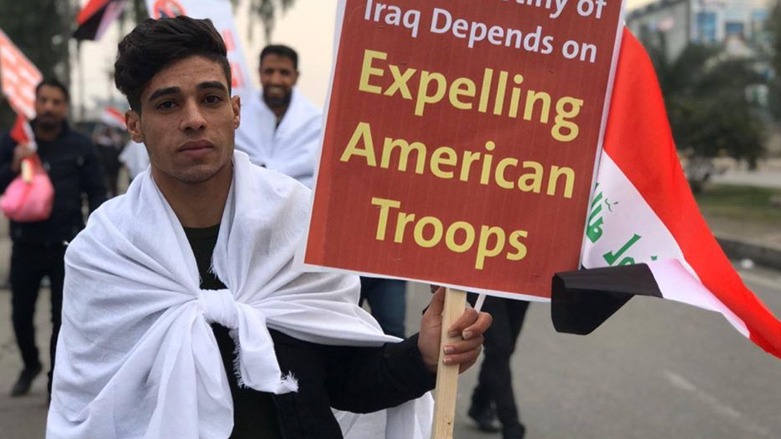'Expulsion of Americans from Iraq an irreversible decision': State of Law

ERBIL (Kurdistan 24) – Former Iraqi Prime Minister Nouri al-Maliki's Iran-backed State of Law coalition stressed on Sunday that the decision to expel American military forces from Iraq is irreversible.
Esam Shakir, the leading member of the State of Law coalition, said that expelling American troops is a major factor in "supporting the stability of Iraq" and reorganizing the Iraqi Security Forces.
"The expulsion of the Americans from Iraq is an irreversible decision," he said.
Shakir said the State of Law would only enter into coalitions with political parties that support its efforts to expel foreign forces from Iraq.
"The Iraqi parliament's decision to expel the foreign forces from Iraq is still valid, and the incoming Iraqi government must commit to implementing it," he stressed.
"The American forces have two military bases in the north and west of Iraq," he added.
In January 2020, Iraq's Council of Representatives voted on a resolution compelling the Iraqi government to expel American and foreign military troops from the country.
The session was attended by 168 parliament members. The Kurds and Sunni Arabs did not attend. The attending lawmakers voted in favor of the bill.
Read More: Iraqi parliament approves draft bill to end US troop presence in Iraq
The bill includes a decision to cancel any request for military assistance from the US-led coalition against ISIS, end the presence of foreign troops on Iraqi soil, and prevent foreign forces from using Iraqi airspace.
The bill also commits the Iraqi government to submit a formal complaint to the United Nations and the Security Council against the US presence in Iraq.
The vote came shortly after a US drone assassinated the head of Iran's Islamic Revolutionary Guard Corps' (IRGC) extraterritorial Quds Force, Qasim Soleimani, and Abu Mahdi al-Muhandis, the leader of the Iran-backed Kata'ib Hizbollah militia in Iraq earlier that month.
Read More: US strike kills Qasim Soleimani and Abu Mahdi al-Muhandis
Following the killing of Suleimani, the Popular Mobilization Forces (PMF) militias organized marches. They chanted slogans demanding the removal of American forces, often threatening further attacks against them if they remained.
Iraqi Shiite parties loyal to Iran were given a potential boost last week after all the 73 Sadrist Movement members of parliament resigned under the instruction of their leader, Muqtada al-Sadr.
Sadr called on Hassan al-Adhari, the head of the Sadrist bloc in parliament, to submit the resignations of his bloc's deputies. The decision came amidst a long-standing stalemate over government formation that has endured for over seven months since the October 2021 parliamentary elections.
Read More: Sadr's latest move shakes up Iraq's political landscape
Following this development, the Shiite Coalition Framework (SCF), of which Maliki's State of Law is a prominent part, announced it would continue with its efforts to form the next Iraqi government.
The SCF affirmed it would take the "necessary steps to address the political crisis and continue dialogues with all political factions to complete the constitutional requirements and form a new government."
Political observers warn that an Iraqi government solely formed by the SCF would be a full-fledged pro-Iran government that would support calls for expelling US troops from Iraq and escalating political and military tensions with the Kurdistan Region.
Sadr has returned to the streets to his supporters, many of whom are poor, angry, and fed up with the rampant corruption of the political elite and Iran's meddling in Iraq's internal affairs. He is mobilizing them against an SCF-formed Iraqi government.
"We are following the latest political developments in Iraq with concern," Kurdistan Region President Nechirvan Barzani tweeted last week.
President Barzani expressed his hope that there would be no turmoil in the country and said that Iraq's parliament should represent all Iraqis. He also called for unity among the Kurdish political parties.
Read More: Kurdistan Region President concerned about political developments in Iraq
Sadr had formed a coalition called Saving the Homeland along with the Sunni al-Siyada alliance and the Kurdistan Democratic Party (KDP). Although that coalition had secured a clear majority of seats in parliament, it did not meet the quota required to form a new government.
Over the past eight months, while the Save the Homeland coalition was trying to form a majority government without the participation of Iran's backed Shiite political parties, the leading members and political parties under this coalition faced many threats from regional powers and armed militias inside Iraq.
The residences of the Iraqi Parliament Speaker Mohammed Al-Halbousi in Anbar province and the Deputy Speaker of Parliament Shakhawan Abdullah in Kirkuk were bombed by PMF militias. In the same period, Kurdistan Region's capital Erbil was repeatedly attacked, either directly by Iran or through its Iraqi militia proxies.
The missile and drone attacks targeted civilian residences, vehicles, and the Kurdistan Region's energy sector. According to the Kurdish leadership, the attacks were a pressure tactic to coerce it into giving up on forming a majority government.
However, after each attack on Erbil, the Kurdish leadership repeatedly affirmed that these "cowardly" attacks would not force the Kurds to surrender or give up the values and principles in which they believe.
"If someone believes that through force and weapons they can impose their control over us, that is impossible," said Kurdistan Democratic Party (KDP) President Masoud Barzani on Saturday. "Others have already tried and did not succeed."
"The Kurdistan Region was built with the blood of the martyrs, and we will protect it with blood," he emphasized. "War is destruction; we hope that there will be no war, but surrendering is worse than war."
The KDP President stressed that "if the constitution is the rule of law, we welcome it, but if they want to seize the powers of the region [Kurdistan Region] once again, that is not acceptable."
